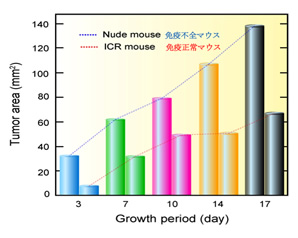Cancer is not a local ailment but rather is known to be a systemic disease, causing unchecked proliferation and metastasis, as well as inducing immunosuppression7,8. This is consistent with our findings that systemic diffusion of sulfur-containing gases occurs with progression of cancer stage, leading to increased diffusion of sulfur-containing gases into the blood circulatory and lymphatic systems, and penetration into organ walls.
As explained earlier, inhibition of heme function is due to the sulfur in sulfur-containing gases in the presence of glucose, which bind to iron at the active centre of heme proteins. Inhibition of heme protein function leads to accumulation of p53 which is normally degraded via the ubiquitin-proteasome pathway. This in turn may lead to potential mutations in cancer-related genes. Many reports attribute the cause of cancer to gene mutations, however, it is unclear why gene mutations occur in the first place. Our research suggests that sulfur-containing gases can cause p53 mutations.
Early stage cancer is curable. Our research suggests that this is because of the low level of sulfur-containing gases in these patients. Gas which diffuses into the body can be metabolized quickly by the liver and therefore the removal of tumor tissue at an early stage can substantially reduce or eliminate sulfur-containing gases in the body. However, in advanced cancer, the level of sulfur-containing gases exceeds the liver detoxification capability and therefore removal of primary tumor tissue alone cannot prevent metastasis or relapse. Furthermore, a high level of sulfur-containing gases lowers liver function and detoxification ability, resulting in a vicious cycle; a decrease in liver detoxification ability leads to an increase in sulfur-containing gases in the blood and damages the lungs that are used for gas exchange. Cancer progression is therefore associated with increased burden to metabolize these gases, and the cancer in turn becomes more difficult to cure.
Figure 10 compares tumor growth in an immunosupressed mouse (nude mouse) and a normal mouse with a functional immune system (ICR mouse). Whether or not the immune system plays a role in tumor growth was investigated. It has been reported that immunity against cancer is effective in the early stage of the disease, however, in advanced cancer, immune system function is attenuated.We believe we can effectively treat cancer if we can inactivate tumor-borne sulfur-containing gases and prevent their diffusion throughout the body.

